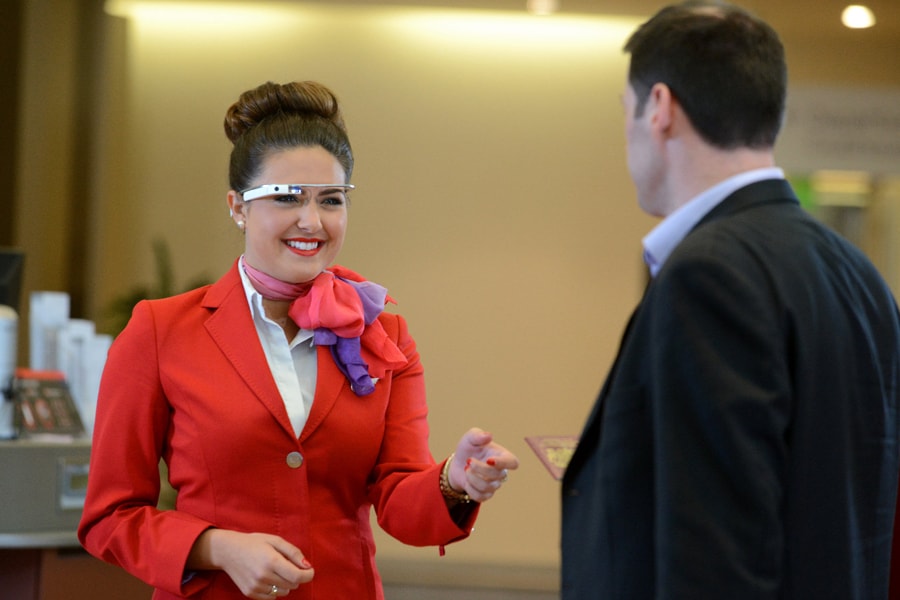Virgin Atlantic passengers will be the first air travelers to experience the benefits of pioneering Google Glass and Sony Smartwatch technology as they arrive at London Heathrow airport, in an innovative pilot scheme which starts today.
Virgin Atlantic, in collaboration with air transport IT specialist SITA, is the first in the industry to test how the latest wearable technology, including Google Glass, can best be used to enhance customers’ travel experiences and improve efficiency.
From the minute upper class passengers step out of their car at Heathrow’s T3 and are greeted by name, Virgin Atlantic staff wearing the technology will start the check-in process. At the same time, staff will be able to update passengers on their latest flight information, weather and local events at their destination and translate any foreign language information. In future, the technology could also tell Virgin Atlantic staff their passengers’ dietary and refreshment preferences. During the six-week pilot, the benefits to consumers and the business will be evaluated ahead of a potential wider roll-out in the future.
Virgin Atlantic’s new solution replaces an existing process for serving passengers traveling in the upper class wing, the airline’s premium entrance at Heathrow dedicated to upper class passengers. Airline staff are equipped with either Google Glass or a Sony SmartWatch 2, which is integrated to both a purpose-built dispatch app built by SITA and the Virgin Atlantic passenger service system. The dispatch app manages all task allocation and concierge availability. It pushes individual passenger information directly to the assigned concierge’s smart glasses or watch just as the passenger arrives at the upper class wing.
Dave Bulman, director of IT, Virgin Atlantic, said: “While it’s fantastic that more people can now fly than ever before, the fact that air travel has become so accessible has led to some of the sheen being lost for many passengers. Our wearable technology pilot with SITA makes us the first in the industry to test how Google Glass and other wearable technology can improve the customer experience. We are upholding Virgin Atlantic’s long tradition of shaking things up and putting innovation at the heart of the flying experience.”
Jim Peters, chief technology officer, SITA said: “2014 is shaping up to be the breakout year for wearable technology, and Virgin Atlantic is the first to bring its vision to reality. At SITA Lab, we’ve taken the lead in testing and trialing this new technology for the air transport industry, and it’s been fantastic to work with Virgin Atlantic to launch the industry’s first wearable technology application.”
The cutting-edge technology is being introduced as Virgin Atlantic publishes the results of a major study of 10,000 airline passengers from across the world on the future of air travel. The results show that as the number of people travelling by plane has increased in recent decades, the experience has lessened. Virgin Atlantic is joining with passengers and calling on the industry to introduce more innovations and radical fresh thinking to meet sky-high consumer expectations.



